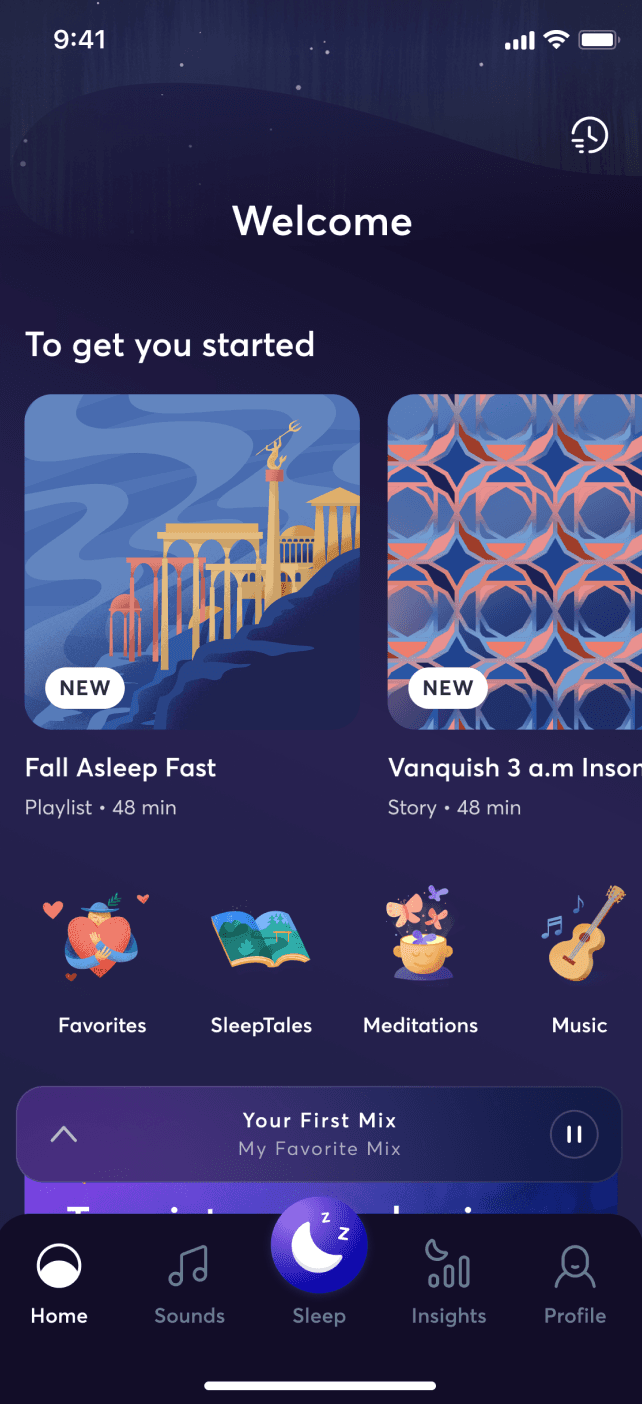
Meditating Before Bed
Insomnia, sleep deprivation, and other sleep disorders may keep you up at night. Even if you don't suffer from a diagnosed sleep disorder, things like a cluttered mind can keep your brain running and prevent you from resting.
The number one cause of lack of sleep in adults is stress. That's because the side effects of stress ultimately take away from the quality of rest you get. Rest isn't only about getting to lay in your bed at night—it's about giving your entire body time to refresh and rebuild from all the work it does throughout the day.
When you don't get enough sleep, you open yourself up to many other health-related issues, including but not limited to:
- High blood pressure
- Heart failure
- Stroke
- Obesity
- Depression/anxiety
- Poor thinking and decision making
- Lack of energy
- Other chronic illnesses
There are plenty of tips and tricks on how to fall asleep faster, but there is one that has been gaining popularity because of its effectiveness—meditation. If you're hesitant to try meditation, don't worry. The benefits of meditation are endless, and you don't have to be a professional to start. There are medication techniques for every level of practice. Each technique can help guide your mind and body into a relaxed state.
What is Sleep Meditation?
In general, meditation helps people to focus less on their thoughts and place more attention on the present moment. Instead of worrying about the things that occurred throughout the day or what will happen the next, meditation requires you to focus on what you feel about the current moment. It's easy for the mind to get distracted and caught up in negative thoughts that don't benefit you.
In specific, sleep meditation is a practice that helps prepare you for proper rest. Many people add sleep meditation to their nightly routine. Letting go of all the things that occur throughout the day helps you to relax your mind before going to sleep.
Can Meditation Help You Sleep?
The short answer to this common question is yes—but it must be done correctly. Meditation has been scientifically proven to be a relaxing practice. For centuries, people of different cultures have done meditation, proving it is effective. Some archaeologists believe that meditation can be dated back to 5000 BCE. It may be a spiritual practice for some, and others may use it just like any other form of exercise.
There are different ways that meditation can help you sleep, but there are some common factors that are included:
Increases Melatonin and Serotonin Levels.
Serotonin
The brain has over 86 million brain cells, and serotonin impacts almost all of them—that is how important that hormone is to your body and the way it functions. While serotonin is the happy hormone, it plays a vital role in getting messages from one part of the brain to another. This hormone also helps regulate your mood and overall well-being.
One of the leading causes of depression is the lack of brain cell reproduction. This could be a side effect of your body being overwhelmingly stressed. Meditation is a natural solution that can help reverse this side effect.
Melatonin
Regarding melatonin, meditation can also increase the production of that hormone. Melatonin is known as the sleepy hormone. No, it's not just a supplement that you can take to help you fall asleep—this is also created in your body. Melatonin is heavily produced in response to something like darkness, which is why the levels increase at night before you go to bed. When that increase doesn't happen, meditation can be of great help.
Studies show that meditation increases melatonin levels by "slowing its hepatic metabolism or augmenting the synthesis in the pineal gland." This is important for your circadian rhythm, also known as your sleep schedule. This tells your body it's time to sleep around the same time every day.
Simultaneously, meditation can also increase dopamine levels.


Reduces Heart Rate and Blood Pressure.
Blood Pressure
Blood pressure refers to how much blood you are pumping through your veins and the rate at which it circulates. Most of this comes from the heart pumping blood. People with preexisting heart conditions may struggle with high blood pressure.
High blood pressure comes with various risk factors, including but not limited to:
- Stroke
- Heart attack
- Dementia
- Diabetes
- Damaged arteries
So how does meditation decrease your heart rate? Meditation increases the amount of nitric acid in the body. Nitric acid creates space in blood vessels by widening them and making blood flow easier. When you're stressed, your body automatically activates a fight-or-flight response. This is your body's reaction to any situation or thing the brain perceives as harmful or a threat to your survival.
As you meditate, your body activates the rest-and-digest function, which helps counteract fight-or-flight. One study performed a series of tests on college students experiencing high-stress levels. The students practiced meditation for 6 weeks. The results showed that their blood pressure significantly decreased compared to when they did not meditate.
Heart rate
Heart rate is self-explanatory, referring to how fast your heart beats. Having a high heart rate is common when doing things like exercising. Having a heart rate that is constantly high is where the problem comes in. This is usually caused by heart-related conditions such as hypertension, coronary artery disease, and poor blood supply to the heart.
A 2021 study showed that continued meditation practice not only decreases your heart ratewhile meditating, but the results can be more permanent and consistent. When you breathe deeply and create the sense of focus that most meditation practices use, it can help reduce your heart rate, as it relaxes your body.
Helps Reduce Cortisol
Cortisol is also known as the stress hormone. It works with your brain to regulate things like:
- Mood
- Sleep schedule
- Blood pressure
- Inflammation
- The way your body breaks down nutrients
- Blood sugar and more
If your body has too much cortisol, it could lead to things like chronic stress. This can bring about other health issues like heart problems and hypertension. You can do different things to reduce cortisol levels in your body, but meditation is a popular solution for many individuals.
The same way that meditation decreases heart rate with breathing a focus is the same way it helps balance cortisol levels. The best way to see meditation's impact on your body is when you practice meditation often. When exercising, one day in the gym won't do much but make your muscles sore. It's the consistency that will yield results. The same thing goes for meditating.
Best Meditations to Fall Asleep Faster
There are many forms of meditation to choose from. Some carry similar benefits, but choosing one specifically for sleep meditation can bring about specific results like more restful sleep and less daytime fatigue.
Here are some of the most popular meditation practices that can act as a natural sleep aid:
Guided Meditation
Guided meditation is a great option for those who are new to meditating. This technique is exactly what it sounds like—you are guided through a meditation session to help you relax. Because you are doing sleep meditation, this guide will be an audio recording, like an online meditation subscription or podcast. Other types of guided meditation may even call for you to be in a class with a physical guide and other people practicing meditation.
Guides help with meditation because they bring focus whenever your mind wanders during your session. They also create a judgment-free atmosphere, so you don't feel pressured to suppress more thoughts and emotions.
You will be guided through a series of steps that help provide a good night's rest. You may be instructed to position your body in a particular manner or perform deep breathing. Guided meditation may sometimes use visualization. This relaxation technique is called guided imagery. It helps you imagine yourself in positive settings, like seeing yourself resting peacefully or being full of energy the next day. The visualizations will help reduce stress and signals your brain to produce the necessary hormones for sleep.
Mindfulness Meditation
Most times, people have trouble falling asleep because their minds are racing. It can be hard to let go of negative thoughts and feelings towards things that occurred during the day. Mindfulness meditation helps release you from the weight of these thoughts.
Thirty percent of adults experience short-term insomnia, and 10% may have it chronically. Research shows that mindfulness meditation is more effective than sleep hygiene interventions for people who suffer from these conditions. Mindfulness brings awareness and attention to the present moment and what you currently feel rather than things that have already happened or may happen in the future.
Body Scan Meditation
Sometimes, the things that keep you up at night stem from things you feel—constant back pain, that headache you get only at night. Body scan meditation is typically done while lying in bed as a form of sleep meditation. As you lay down, you can focus on the physical sensations in your body, some you probably didn't realize before. These aches and pains that keep you awake are acknowledged. This helps your body relax.
BetterSleep Meditations
Finding the best meditations to help you sleep can be difficult, especially for beginners. Luckily, the process doesn't have to be one you do on your own. BetterSleep provides plenty of meditations to choose from that can help you get better sleep each night. Here are a few:
- Letting Go of Your Day- This meditation helps you release thoughts about what happened during the day so you can enjoy a restful sleep. This 13-minute meditation allows you to create a relaxing setting and remove distractions. For some people, you may want to do things like make your bedroom cool. As you're comfortable, you breathe slowly and connect with your thoughts.
- Mindfulness Meditation for Sleep- This meditation starts, like many others, by breathing and creating a sense of awareness. This meditation helps give you a restful state of mind before bed, and you only need 15 minutes to finish the job.
- Self-Love Body Scan- This sleep meditation helps you show appreciation for every part of your body. Body scan meditation is longer than other meditation styles, reaching up to 30 minutes a session. Although, the outcome of this meditation is worth the time spent, as you will easily drift into a peaceful slumber.
There are plenty of other sleep meditations that BetterSleep has to offer. To start seeing results with meditating, you are encouraged to do at least six sessions. Consistency will yield better results.






















